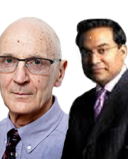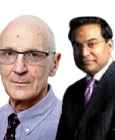Memory
How to Evaluate the Memory of Anybody, Including the President
How could psychologists resolve the controversy over Joe Biden's memory?
Posted February 12, 2024 Reviewed by Michelle Quirk
Key points
- There is more than one type of memory.
- Expert evaluation of memory involves brain scans and neuropsychology testing.
- People with a good memory for some things may experience a cognitive "trade off" over learning new things.
A media furor has developed over whether the president of the United States has such severe memory problems as to question his capacity to lead the free world.

"My memory is fine," he insisted in a surprise news briefing, following the report that questioned his memory.
But one problem with the debate is that, although heated, none of the participants so far appear to be qualified to properly assess memory.
Department of Justice Special Counsel Robert Hur interviewed 81-year-old US President Joe Biden for more than five hours and then published a 345-page report, declaring that the president's memory had "significant limitations."
But Rober Hur is not a clinician, nor is he a qualified expert in assessing cognition.
As Mr. Biden sought to rebut reporters' questions arising from the report about his age and mental acuity, the president inadvertently referred to Egyptian leader Abdul Fattah al-Sisi as the "president of Mexico."
Also, just a few days earlier, Biden had twice made gaffes in anecdotes wrongly identifying dead European leaders as having discussed with him the events of the attack on the Capitol on January 6, 2021.
Psychiatrists and psychologists are frequently called upon to assess a client’s memory, not just as part of a clinical evaluation, but also for court cases, where experts might clash over the diagnosis of a recall problem.
Problems With the Media Conversation
The first problem with the media conversation about the president’s memory is that much has been made of his age, yet there are studies that suggest memory decline in the general population can even be found to begin in early adulthood, even in your 20s. Unless someone is formally tested, a younger political rival could in fact suffer as poor a memory, or even worse, than an older candidate.
Even though on average memory starts to gradually decay from age 60 to 65 years, there is also substantial variability in mental aging progression, with some of the elderly demonstrating minimal or no decline. Predictors of so-called "successful cognitive aging" include high educational attainment, good health, large social network, and lifestyle and genetic factors (carriers of a version of the catechol-O-methyltransferase gene), including also more physical activity and even something as simple as just living with someone.
Another problem with the media debate over Biden’s mental state is that it omits the fact that memory is a complex system with more than one type of remembering.
Of the different recall systems, episodic memory is considered to be the most age-sensitive, and this refers to remembering events from the past: what happened, where it happened, and when. This could mean recognizing a person as familiar, but not being able to recall the person's name or where and when you last met.
The part of the brain most associated with memory is the hippocampus, and various brain scanning technologies such as functional magnetic resonance imaging (fMRI) and also certain forms of positron emission tomography (PET) demonstrate a close relationship between hippocampal brain activity and memory. It may be possible that such brain-scanning evidence, alongside neuropsychology testing, could be used to settle debates over the state of a particular person’s memory.
The size of the hippocampus varies among people and has been linked to our memory capacity.
One of the assumptions that has underpinned the Biden amnesia controversy is that if memory declines there isn’t much you can do about it.
But recent research suggests that actively learning things actually changes the size of your brain.
Research on Brains of London Taxi and Bus Drivers
The hippocampi of licensed taxi drivers in London have recently become of special scientific interest.
This unique group undergoes extensive training (in adulthood) over two to four years known as acquiring ‘‘The Knowledge." This is reputedly one of the most arduous memory tests, involving learning the layout of 25,000 streets in London as well as thousands of places of interest, finally culminating in a stringent exam at the Public Carriage Office to obtain an operating license.
If the part of the brain linked with visuospatial or geographical memory, the hippocampus, is different in taxi drivers, this would suggest that their learning actually changed the size of parts of their brain.
MRI scans showed greater brain grey matter volume in the posterior hippocampi and reduced anterior hippocampal grey matter volume in taxi drivers when compared with an age-matched control group.
A more recent study compared London taxi drivers with a control group who also spend all day driving about in the busy London traffic dealing with customers—namely, London bus drivers. Unlike taxi drivers who navigate extensively around the city, bus drivers operate only along a fixed set of routes.
This latest study found that, compared with bus drivers, taxi drivers had greater grey matter volume in the posterior hippocampi and less grey matter volume in the anterior hippocampi.
The authors of the study argued that it might seem somewhat paradoxical that the grey matter in the posterior hippocampus increases with more navigation experience over time, since one might have predicted instead that taxi drivers would have most knowledge when they are newly qualified. But these researchers found that taxi drivers report that their "mental map" of London becomes more "fine-tuned" through experience of the relationships among roads and between places.
Similar findings of apparently environmentally driven brain plasticity have been reported in several other groups including musicians, jugglers, and bilinguals. In these groups, positive associations between grey matter and the time spent learning and practicing have also been found.
Successful navigation in familiar environments has often resulted in activation of the posterior hippocampus; in contrast, learning the layout of a new environment has been associated with activity in the anterior hippocampus.
Neuropsychological testing revealed that taxi drivers, while performing better than bus drivers on tests relating to knowledge of London, were significantly poorer at acquiring or retrieving novel visuospatial information.
The authors of this study concluded that the amazing capacity to not get lost in a large complex city is accompanied by greater grey matter volume in the posterior hippocampus of taxi drivers, but these researchers speculate that there may be a price to pay for this expertise, as reflected in less grey matter volume elsewhere in the hippocampus and a compromised ability to acquire or retrieve new visuo-spatial information.
Maybe instead of just focusing on what Biden, or any presidential candidate, can merely recall, a test of their ability to learn new things might be even more pertinent.
References
Josefsson M, de Luna X, Pudas S, Nilsson LG, Nyberg L (2012) Genetic and lifestyle predictors of 15-year longitudinal change in episodic memory. J Am Geriatr Soc 60:2308–2312, doi:10.1111/jgs.12000, pmid:23110764
Salthouse, Timothy A. PhD. Memory Aging From 18 to 80. Alzheimer Disease & Associated Disorders 17(3):p 162–167, July 2003.
L. Nyberg. Functional brain imaging of episodic memory decline in ageing. Journal of Internal Medicine Volume 281, Issue 1 January 2017 Pages 65–74
Maguire EA, Gadian DG, Johnsrude IS, Good CD, Ashburner J, Frackowiak RSJ, Frith CD. 2000. Navigation-related structural change in the hippocampi of taxi drivers. Proc Natl Acad Sci USA 97: 4398–4403.
London Taxi Drivers and Bus Drivers: A Structural MRI and Neuropsychological Analysis Eleanor A. Maguire, Katherine Woollett, and Hugo J. Spiers HIPPOCAMPUS 16:1091–1101 (2006)




